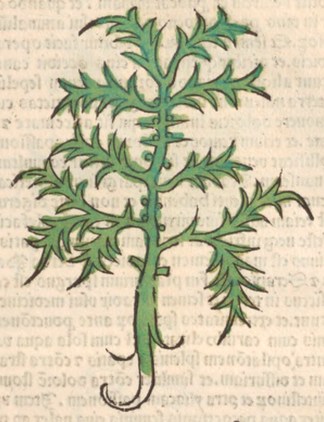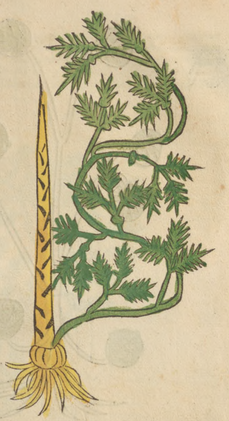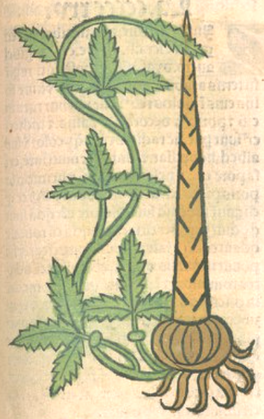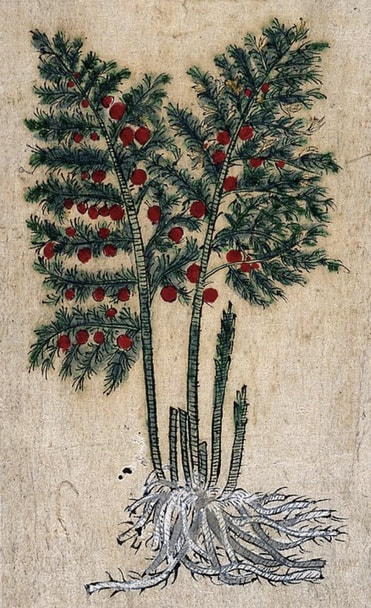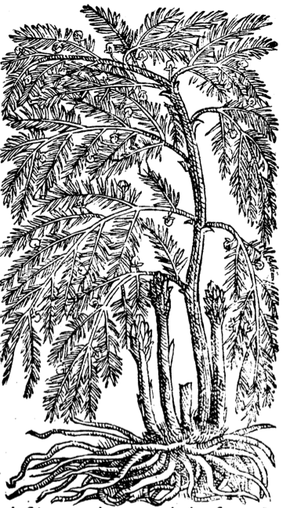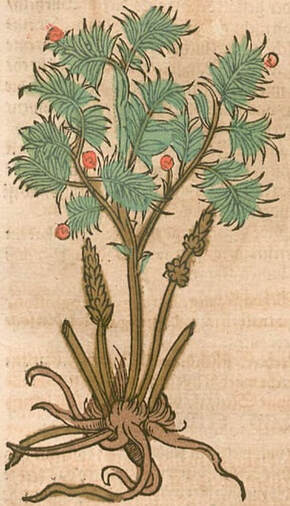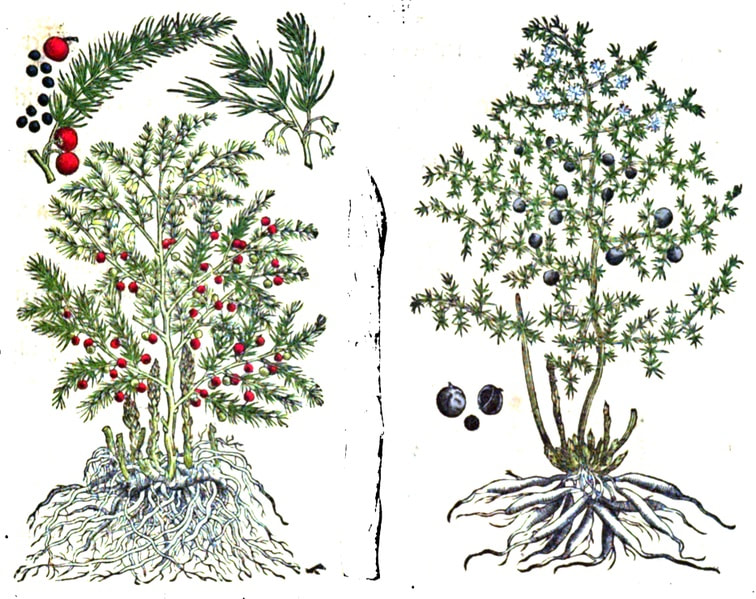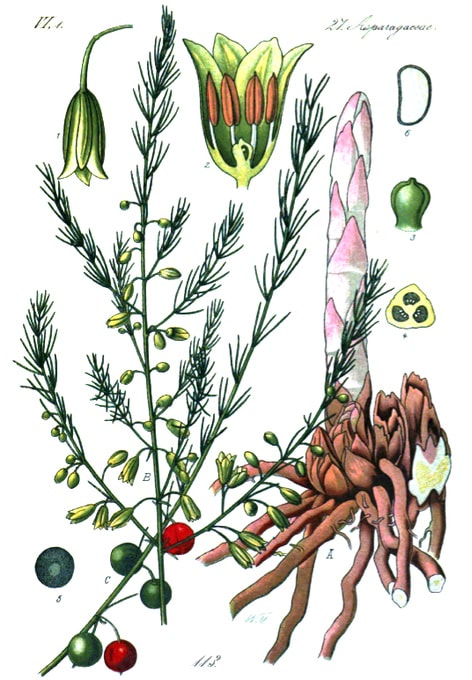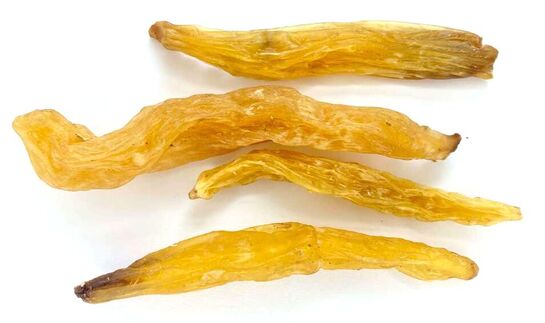Sentry Page Protection
|
Della Materia Medicinale, Andrea Valuassori, 1562
|
Krauterbuch, Lonitzer, 1578
|
Left: Garden Asparagus; Right: Asparagus sylvestris
Kreutterbuch, Matthiolus, 1586
Kreutterbuch, Matthiolus, 1586
Flora von Deutschland, Kohler, 1886
Asparagus root Tian Men Dong (Adam 2023)
Botanical name:
Asparagus officinale; the wild is A. tenuifolia
Three types were recognised traditionally in the West:
In TCM, two types are noted: 'There are two species of Tian Men Dong: One with a rough leaf with thorns and the other with a lustrous leaf without thorns. Both of them are Tian Men Dong.' (Su Gong)
All traditions use varieties of Asparagus root, all being synonymous in use to A. officinalis with the exception of A. racemosus (Shatavari) which is similar, but slightly different.
A. TCM: A. cochinchinensis and others (Tian Men Dong)
B. Ayurveda uses 2 varieties of Asparagus root:
Parts used:
Root; rarely the seed
Asparagus officinale; the wild is A. tenuifolia
Three types were recognised traditionally in the West:
- Garden
- Wild
- Ferny.
In TCM, two types are noted: 'There are two species of Tian Men Dong: One with a rough leaf with thorns and the other with a lustrous leaf without thorns. Both of them are Tian Men Dong.' (Su Gong)
All traditions use varieties of Asparagus root, all being synonymous in use to A. officinalis with the exception of A. racemosus (Shatavari) which is similar, but slightly different.
A. TCM: A. cochinchinensis and others (Tian Men Dong)
B. Ayurveda uses 2 varieties of Asparagus root:
- A. adscendens (White Musali, used as A. officinale);
- A. racemosus (Shatavari) (see separate entry)
- A. racemosus (Male, with thorns, superior)
- A. officinalis (Female, without thorns, inferior)
Parts used:
Root; rarely the seed
Temperature & Taste:
Warm, moist. Sweet (Unani, Tibetan Medicine)
Some regarded it as mildly Warm and Dry, while other including TCM, regarded it as Cool and Moist.
"According to Galen it is moderate in tempera- ment i.e. neither hot nor cold" (Avicenna)
Classification:
2A APERIENT MEDICINES. 2G. CLEANSING
3G. EMMENAGOGUE. 3H. LACTAGOGUE. 3I. APHRODISIAC. 3J. INCREASE SEMEN. 3M. ARTHRITIC
4b. OPTHALMICS. 4e. STOMACHIC. 4g. HEPATIC. 4h. NEPHRITIC. 4j. NERVINE
Warm, moist. Sweet (Unani, Tibetan Medicine)
Some regarded it as mildly Warm and Dry, while other including TCM, regarded it as Cool and Moist.
"According to Galen it is moderate in tempera- ment i.e. neither hot nor cold" (Avicenna)
Classification:
2A APERIENT MEDICINES. 2G. CLEANSING
3G. EMMENAGOGUE. 3H. LACTAGOGUE. 3I. APHRODISIAC. 3J. INCREASE SEMEN. 3M. ARTHRITIC
4b. OPTHALMICS. 4e. STOMACHIC. 4g. HEPATIC. 4h. NEPHRITIC. 4j. NERVINE
Uses:
1. One of the Five Opening Roots:
-for obstructions; cleanses and opens the Liver, Spleen and Kidneys
-opens the body: gently promote urine and bowel movement; constipation with dryness and deficiency
-promotes Urine; Edema; hot, painful or dribbling Urine
-Gravel, Stones
-"removes all kinds of visceral obstructions, especially those of the liver and kidney" (Avicenna)
2. Strengthens Kidneys and Liver, Nourishes Yin:
-Kidney and lower back pain; weak knees and legs; chronic Joint Pain; tightness of the ligaments (TCM, West)
-pains of the Lower Body from deficiency
-Seminal Emission, Impotence; promotes Sexual desire
-Deficient Heat; Consumption, Wasting
-"Its decoction is taken orally in cases of back pain and Sciatica" (Avicenna)
-"increases the quantity of Semen and also improves Libido... also useful in cases of difficulties in conception" (Avicenna)
-Rasayana: Nourishes the 7 Bodily Constituents; increases Semen and Essence (Ayurveda)
-'reinforces the Bone and Marrow' (Shen Nong Ben Cao)
-'It moistens the Five Viscera, tonifies five overstrains and seven impairments' (Da Ming)
-'After having such drugs over 100 days, the person will get very strong'. (Zhang Yu Xi)
3. Nourishes the Blood, Promotes Circulation:
-anemia, weakness
-scanty Menstruation; used for Menstrual disorders with deficiency
-Infertility, Threatened Miscarriage
-Varicose veins, Hemorrhoids
-improves Eyesight
-'nourishes the Skin and Muscle' (Ming Yi Bie Lu)
-'Take the decoction to beautify one’s skin by making the skin whiter, more lustrous and cleaner'. (Zhen Quan)
4. Moisten and Strengthen the Lungs, clears Lung Heat:
-chronic cough, cough with Bloody sputum, chronic Bronchitis, Whooping Cough
-'good for treating coughing with dyspnea due to the Lung Qi disorder, or Asthma with dyspnea, pulmonary flaccidity with carbuncle and the spitting of pus'. (Zhen Quan)
5. Nourishes Yin, Stops Wind:
-Epilepsy, Hysteria, Apoplexy, Cramps, Numbness, Spasms
-Brain and Memory tonic; increases Intellect
-'good for treating arthralgia and hemiplegia due to attack of pathogenic Wind and Damp'. (Shen Nong Ben Cao)
-'Long¬term use enables one to feel happy and vigorous and enjoy a long life' (Shen Nong Ben Cao)
6. Used for Cancer:
-Recently the spears and roots have been advocated in Cancer treatment.
7. Externally:
-root decoction gargled for Toothache and spongy gums
-in hip-baths or baths for all pains of the lower body (Culpeper)
-root is steeped in wine or vinegar for Dislocations (Dioscorides)
-concentrated decoction is 'extremely effective' against Freckles (Norbu)
Dose:
1. In India it is typically decocted in Milk to nourish sperm, Yin and as a strengthening tonic.
2. The root was often decocted in wine in the west tradition. This is more warming, helps move the Blood, and is better for opening obstructions, Strangury, Joint pain etc. A tincture will have similar effects.
Powder: 2–5 grams
Decoction: 6–12 grams
Note:
1. TCM uses the root prepared (steamed) with wine which weighs heavier and affects doses.
2. In TCM, Asparagus root is regarded as a Cool, moist, Yin (Sperm) tonic. In Ayurveda and Tibetan Medicine, it is often classed as warm, and even regarded as Aphrodisiac, usually the effect of a warming Yang tonic. Firstly, its effects are dependent on the herbs it is combined with. Secondly, while moist, and therefore nourishing to the Yin, it also has warming properties, and therefore can be looked at as both a Yin and Yang tonic.
Corrective:
1. Sugar; Honey (Unani)
2. Cold Seeds
Substitute:
1. Ophiopogon Mai Men Dong
2. Soloman's Seal
3. Tanacetum umbelliferum
4. Pine seed
Preparation:
1. As soon as the root are dug they are washed then boiled in twice the amount of water until the water is absorbed. This makes the root more warming..(Tibet)
1. In India it is typically decocted in Milk to nourish sperm, Yin and as a strengthening tonic.
2. The root was often decocted in wine in the west tradition. This is more warming, helps move the Blood, and is better for opening obstructions, Strangury, Joint pain etc. A tincture will have similar effects.
Powder: 2–5 grams
Decoction: 6–12 grams
Note:
1. TCM uses the root prepared (steamed) with wine which weighs heavier and affects doses.
2. In TCM, Asparagus root is regarded as a Cool, moist, Yin (Sperm) tonic. In Ayurveda and Tibetan Medicine, it is often classed as warm, and even regarded as Aphrodisiac, usually the effect of a warming Yang tonic. Firstly, its effects are dependent on the herbs it is combined with. Secondly, while moist, and therefore nourishing to the Yin, it also has warming properties, and therefore can be looked at as both a Yin and Yang tonic.
Corrective:
1. Sugar; Honey (Unani)
2. Cold Seeds
Substitute:
1. Ophiopogon Mai Men Dong
2. Soloman's Seal
3. Tanacetum umbelliferum
4. Pine seed
Preparation:
1. As soon as the root are dug they are washed then boiled in twice the amount of water until the water is absorbed. This makes the root more warming..(Tibet)
Main Combinations:
Asparagus and Parsley root
Opening Roots - Five & Two
One of the Five Opening Roots: with roots of Celery, Parsley, Broom and Fennel, primarily used to strengthen and open the lower body, promote urine and bowel movements.
1. To Open the Liver: Five Opening Roots, Chicory, Agrimony, Dandelion, Parsley seed, Licorice
2. Liver Heat and Inflammation, with Dandelion root, 4 Cold Seeds, Chicory, Licorice (as in Hepatic Decoction)
3. Skin diseases, Acne, Boils, Eczema, with Celery root, Fennel root, Chicory, Dandelion, Fumitory, Hops, Dodder, Licorice (as in Syrup of Chicory and Rhubarb)
4. Nourish the Yin,
i. Asparagus Tian Men Dong with Ophiopogon Mai Men Dong (TCM)
ii. Asparagus root with Marshmallow root, Licorice
iii. Asparagus root, Soloman's Seal, Comfrey root
5. Lower Back Pain:
i. Asparagus root, Comfrey root, Soloman's Seal
ii. Asparagus seed, Cumin (1 dram each), powder and take with white wine. (The Secrets of Alexis, 1615)
6. Sciatica, decoct the root in wine. (Herbarius latinus, Petri, 1485)
7. Urinary diseases with Yin deficiency: combine with Couch grass, Marshmallow root, Licorice, Raisins, Plantain, Maidenhair and the Cold seeds. Used for Burning Urine, Stranguria, Dysuria, Gravel, Stones, Gonorrhea; also chronic Cough, Bronchitis; good for Yin deficiency.
8. Yin deficient Heat: combine with Comfrey root, Violet and the Cold seeds
9. Intestinal inflammation, Asparagus (Safed Musali) with Emblic Myrobalan, Madder, Licorice
10. Wind associated with Yin deficiency: combine with Peony root and Mistletoe
11. Vertigo, with Lavender, Horehound, Fennel, Cinnamon (as in Decoction for Vertigo)
12. Paralysis, combine with Peony root, Butchers Broom, Betony, Cowslip, Cinnamon and Raisins (as in Tincture for Paralysis)
13. Chronic Cough, Cough with Blood-streaked Sputum: combine with Comfrey, Elecampane, Licorice
14. Asthma: 'To protect the Lung Qi, and disperse the invading blood with Heat into the Lung with asthma and dyspnoea, use Tian Men Dong together with Ginseng and Astragalus Huang Qi. It works miraculously.' (Zhang Yuan Su)
15. Female Infertility, Asparagus (Safed Musali), Turmeric, Sida, Licorice
16. Impotence:
i. 'good for treating impotence. Take the drug regularly over a long period of time.' (Sun Si Miao)
ii. Impotence, Male Infertility, Asparagus (Safed Musali) with Withania, Sida, Mucuna, Tribulus
17. Aphrodisiac, combine Asparagus (Safed Musali) with Withania and Tribulus terrestris seed (Ayurveda)
18. To promote Milk, Asparagus (Safed Musali) with Fennel, Bishop's Weed
19. Pediatric tonic: combine Asparagus (Safed Musali) with Rose, Emblic Myrobalan, Withania, Long Pepper and a little Calamus (Ayurveda)
20. To not feel (fear) the Cold, Asparagus Tian Men Gong and Poria Fu Ling. Take several times daily. (Sheng Hua Jing)
21. To promote Longevity and prevent hair turning white, Asparagus Tian Men Dong with Rehmannia Shu Di Huang. (Zhen Quan)
22. Toothache, decoct Asparagus root and Pyrethrum in wine and use as a mouthwash. (Herbarius latinus, Petri, 1485)
Major Formulas
Syrup of Five Opening Roots
Electuary for Back Pain (Galen)
Hepatic Decoction (Hoffman)
Syrup of Chicory and Rhubarb (Nicholas)
Syrup of Marshmallow (Fernel)
Syrup of Mugwort (Augustana)
Wine for Scrophula (Renodeus)
Tincture for Paralysis
Dhatuvallabha Churna (Ayurveda)
1. Diuretic Species (Powder):
i. Fennel root, Dyer's Broom, Restharrow root, Asparagus root, Parsley root (equal parts) (Pharmacopoeia Gallica, 1818)
ii. Fennel root, Dyer's Broom, Restharrow root, Asparagus root, Parsley root, Star Thistle root, Wild Parsley root, Strawberry root (equal parts)(Formulaire Pharmaceutitique a l’usage des Hospitaux Militaires de France, 1821)
2. Diuretic Decoction:
i. Asparagus root, Dyer's Broom, Sea Holly root, Parsley root, Fennel root
3. Opening Broth:
i. Mutton neck (6 oz.), Asparagus root, Dyer's Broom root (half oz. each), Wood Lice (40 in number), Chicory leaf, Rupture-wort (half handful)
Cautions:
Generally safe. Best not used in Phlegm and Damp conditions.
Main Preparations used:
Distilled Water of the whole fresh; often used as one of the Five Opening Roots.
Generally safe. Best not used in Phlegm and Damp conditions.
Main Preparations used:
Distilled Water of the whole fresh; often used as one of the Five Opening Roots.
Click the Tabs above for more information on this Medicine
|
'Asparagus was well known to the Greeks and Romans both wild and in a cultivated state. Hippocrates mentions it in his treatise on diet, and in his treatise on the Diseases of Women he says that the berries taken in wine promote conception. Dioscorides and Pliny describe its medicinal properties, and Cato (De re Rust. c. 161) gives full directions concerning its cultivation. The ancients considered it to be a wholesome vegetable, dispelling flatulency and acting as a mild aperient, diuretic and aphrodisiac. They administered the root in wine for calculous affections and pains in the uterus, and also considered it beneficial in elephantiasis. Ibn Sina calls it haliun and quotes Galen's opinion of its medicinal value.
The Western Arabs call it Isferaj; in Persia it is known as Marchubeh and Margiyeh "snake wort," from its being considered to be an antidote for snake poison. Wild asparagus, the A. tenuifolius of Linnaeus, was known to the Romans as Corruda, a name still current |
in the south of France, where the plant is valued for its medicinal properties up to the present time. Broussais considered asparagus to be a sedative in palpitation of the heart, and it is still used in France as a diuretic in cardiac dropsy and chronic gout. The young shoots when eaten as a vegetable are well known to communicate a peculiar and offensive odour to the urine, a syrup for medicinal use is prepared with their juice, 100 parts after clarification being added to 190 parts of sugar.
Some physicians consider asparagus to be useless as a diuretic and even injurious to the bladder, but as far as our experience goes it has no ill-effects when taken daily for a considerable time. Indian Mahometan writers on medicine merely retail what the ancients have said about this plant; they usually prescribe the dried berries which are to be found in the bazars of all large towns'. (Pharmacographia Indica, Dymock, 1893) |
Daoists texts on Asparagus Tian Men Dong (from Ben Cao Gang Mu)
Bao Pu Zi says:
Du Ziwei ate Chinese asparagus. He managed 80 wives, had 140 sons, and could travel 300 li (150 km) a day.
Lie Xian Zi says:
Zhi Song Zi ate Chinese asparagus. When his teeth fell out they grew in again. The fine hairs on his head grew in again.
Shen Xian Zhuan says:
Gan Shi was a man of Taiyuan. He took Chinese asparagus. He was among people for three hundred years.
Bao Pu Zi says:
Du Ziwei ate Chinese asparagus. He managed 80 wives, had 140 sons, and could travel 300 li (150 km) a day.
Lie Xian Zi says:
Zhi Song Zi ate Chinese asparagus. When his teeth fell out they grew in again. The fine hairs on his head grew in again.
Shen Xian Zhuan says:
Gan Shi was a man of Taiyuan. He took Chinese asparagus. He was among people for three hundred years.


